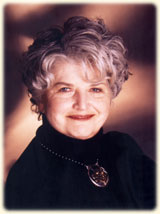E D I T O R I A L S
  Election
Post-Mortem Election
Post-Mortemby Patricia Nell Warren Updated from the original version published in A & U Magazine How did the Republicans REALLY get control of the government? So we face four more years of Republican leverage on everything from war to marriage and healthcare. It’s no secret that “Republican” means more right-wing religious leverage as well. Bush’s victory doesn’t bode well for gay people, who are viewed with “moral” distaste by so many of the winners. So why did the Democrats lose? Every pundit has been rushing to speculate. In my opinion, the Dems didn’t lose just because of voting fraud or a wishy-washy message. Sure, these were contributing factors. So was the apathy that many moderate and liberal Americans continue to feel about politics. Bush even got a little help from the 23 percent of gay voters who supported him. But the Democrats also lost because they haven’t looked for an effective way to counter illegal -- and deadly effective -- electioneering by religion-based nonprofits. Right after the election, I saw a right-wing commentary complaining that Rock the Vote was “partisan” in their recruitment of Democratic youth voters, allegedly violating their IRS nonprofit status. It’s the height of hypocrisy for the Republican winners to bring this up. Why? Because the number of churches and pastors, both Catholic and Protestant, who circulated voter guides telling their flocks to vote for Bush & Co. was probably ten times the number of liberal/Democrat instances of “partisanship.” Indeed, right-wing church electioneering may have clinched Bush’s victory. CNN commented—accurately, I think—that the vote was driven by white men, people with incomes over $100,000 and churchgoers. How do right-wing church leaders get away with this illegal partisan strategy? First they have several times the donation base of Democrats, and create well-funded national nonprofits that do their work for them, notably the mass printing of voter guides. By the time the IRS wakes up and whacks an organization’s nonprofit status, the organization has already politicized a lot of churchgoers. The leaders just say “mox nix” and start another nonprofit. Religious righters have played the “mox nix” game since 1979, when a group of right-wing elite got together and launched a now-historic nonprofit named the Moral Majority. Before then, most U.S. churches weren’t very involved in politics. As a reaction to sexual liberation, gay rights, the legalizing of abortion, and other issues, the MM was the first to register churchgoing voters, distribute voter guides, etc. The organization was a major force in getting Ronald Reagan elected. When the IRS finally stripped the MM of its nonprofit status in 1989, its founders didn’t miss a beat—they started the Christian Coalition, which went like a house afire till it was de-nonprofited in 1999. But the MM idea has multiplied like bacteria—today there are dozens of large church-based national nonprofits, and they all did their “partisan” thing for the 2004 election, churning out hundreds of millions of voter guides. They even had the nerve to insist that their voter guides were “non-partisan.” Voter guides are often distributed door-to-door and on the streets. But when guides are distributed to churches, they acquire a lot of extra force with believers. When their own pastor personally hands out voter guides, or recommends them from the pulpit, many believers go to the polls and do exactly what they’re told. Organizations like People for the American Way can actually calculate the effect of voter guides. For instance, in the 1992 elections, PFAW estimated that the Christian Coalition helped elect into office some 200 candidates in the 1992 elections. Today church political power is rooted in churches’ freedom from taxation, which allows them to amass the enormous wealth needed to be big political players today...and to fund more nonprofits that print voter guides. Though many churches apparently break the law as much as the Christian Coalition did, the IRS has been curiously loath to crack down wholesale on churches, who instantly start screaming about "freedom of religion" if anybody tampers with their politicizing. But if the first offense would instantly cost an individual church or a national organization its nonprofit status, maybe more of them would refrain from telling their flocks how to vote. Maybe more of them would refuse to distribute voter guides. The Democrats are trying desperately to climb out of the black hole they're fallen into. But it isn't enough to put a vigorous leader like Howard Dean at the helm, or to re-think issues. They need to put a stop to this illegal electioneering that has proven to be such a powerful weapon against them. One group that fights the partisanship is Americans United for Separation of Church and State. Individual Americans need to be writing the IRS and the Federal Election Commission to demand that the government expand their crackdowns. “But surely churches and religious organizations have a right to political opinions,” you might protest. Well, of course they have a right. But if they want to express their opinions publicly at election time, like the rest of us, they should pay taxes like the rest of us too. ___________________ What can we do? Join lobbying organizations like the ACLU, PFAW, Move On, Americans United and others that are starting to make moves on the church nonprofit issue. Write your Congressional representatives and the Federal Election Commission. Make your voice heard. Further reading: Americans United for Separation of Church and State: www.au.org/site/PageServer Federal Election Commission: www.fec.gov Patricia Nell Warren, author of fiction bestsellers like The Front Runner, also writes provocative commentary. Her writings are archived at www.patricianellwarren.com. Reach her by e-mail at patriciawarren@aol.com. Copyright © 2004 by Patricia
Nell Warren. All rights reserved
|
  Abuse in Our Community: The Hidden Epidemic Abuse in Our Community: The Hidden Epidemic by Jeffrey Lee Williams, Junior "One very important reason why it is so hard to find out how many gay men are battered by their mates is that the gay community would rather not know." — David Island and Patrick Letellier
According to a new study, domestic violence occurs just as often among gay couples as it does among heterosexuals. In fact, according to the research funded in part by the National Institutes of Health in 2004, more than a fifth of the 2,881 men surveyed—in New York, Chicago, San Francisco, and Los Angeles—had been physically abused by an intimate partner during the previous five years. It is a rate comparable to the incidence of domestic violence among heterosexuals. “This study demonstrates that intimate partner abuse among urban MSM (men who have sex with men) is a very serious public health problem,” wrote the researchers in the December issue of the American Journal of Public Health. “It sheds light on a subject that has long been taboo within and outside the MSM community—that is, men are also victims of battering and not solely perpetrators.” In March of 2004, there was a meeting in Calgary, Canada of the Alberta Roundtable on Family Violence and Bullying. One of the speakers of over two hundred representatives of service agencies, government, police, health care providers, and survivors of abuse, and a psychologist with Edan Counseling Associates in Calgary, Jane Oxenbury spoke of abuse among gay and lesbian couples. She pointed out that at least 33% of people in homosexual relationships are, in fact, abused. “This is similar to the heterosexual relationships, which makes sense—because everybody learns this through the same avenues.” Oxenbury also said that she was encouraged with the progress that’s being made in the area of domestic violence, but is hoping the cause of gay and lesbian victims won’t be lost in the shuffle. The problem is that for us, it is still hard to report a problem to the traditional authorities. We are often worried that the person would not believe us, and for those who are still in the closet, we are concerned that we cannot talk about this without coming out about who we are. Some of us may even fear that our own community may disown us. After domestic violence has occurred, victims may be afraid they may lose their community or that their friends will choose the abuser. The abuser may threaten to tell friends or family that the victim is gay. A victim’s partner may be the only link in the victim’s life that is associated with the gay community. Therein lies the problem. Some people in abusive relationships will not report abuse because cops often will not know whom to arrest in a situation such as this. Victims are often left by police or arrested. It’s traumatizing as a victim when you are trying to get assistance from an officer. Outside of the gay and lesbian anti-violence groups, there aren’t many organizations out there that provide services to gay and lesbian people, specifically in dealing with domestic abuse. The issue here isn’t whether domestic abuse occurs in our community. The issue is what we are going to do about it. Though help may seem so far away when you are a gay or lesbian victim of domestic abuse, there is help there and it is imperative that you find it before it is too late. Recently, I have read about a few cases here in the states and in Canada where gay and lesbian couples have been to court regarding domestic abuse. Though the courts in Canada are far more sensitive to the issue of abuse in alternative homes, here in the states there is still a sense of hope and faith in a judicial system. In a time where our president is seemingly making it his business to appoint anti-gay judges to the supreme court, still pumping his fists in the air against gay marriage and basically telling us we do not matter, regardless of getting 23% of the gay vote, there are places to go for help. The most notable organization is the local Gay and Lesbian Anti-Violence Organization, which works closely with the LAMBDA association. This article is intended to help gays and lesbians who may be in abusive relationships to try to find the courage to get out, get help, and get better. It is important to know that you are not alone and that there is never any reason good enough for a partner to physically abuse you. In closing, we know that gay male domestic violence exists. We know it shares similarities with heterosexual domestic violence and also has unique issues and qualities. We know gay victims want and need help. As individuals, we can open our eyes and our hearts to our neighbors and friends experiencing this very real tragedy. Our efforts also must have the foundation of our community, appreciating that once we have the understanding and support of the gay community we will have a network of resources second to none and most importantly, the silence will be broken. Copyright©
Jeffrey L. William, Jr. All rights reserved
|